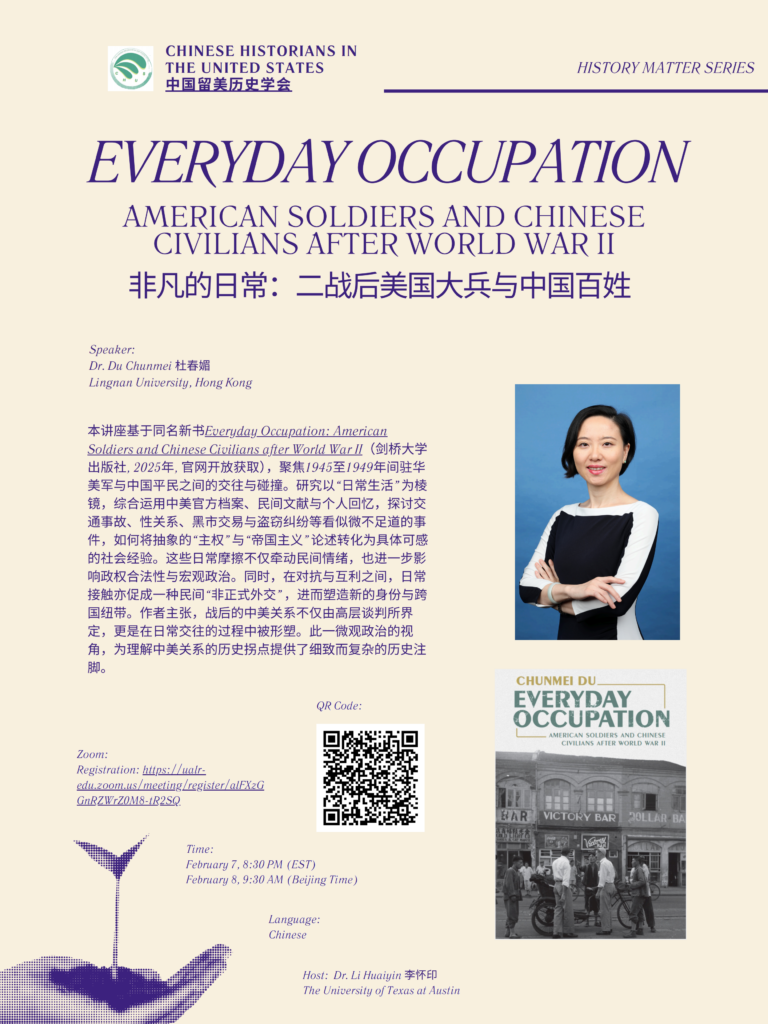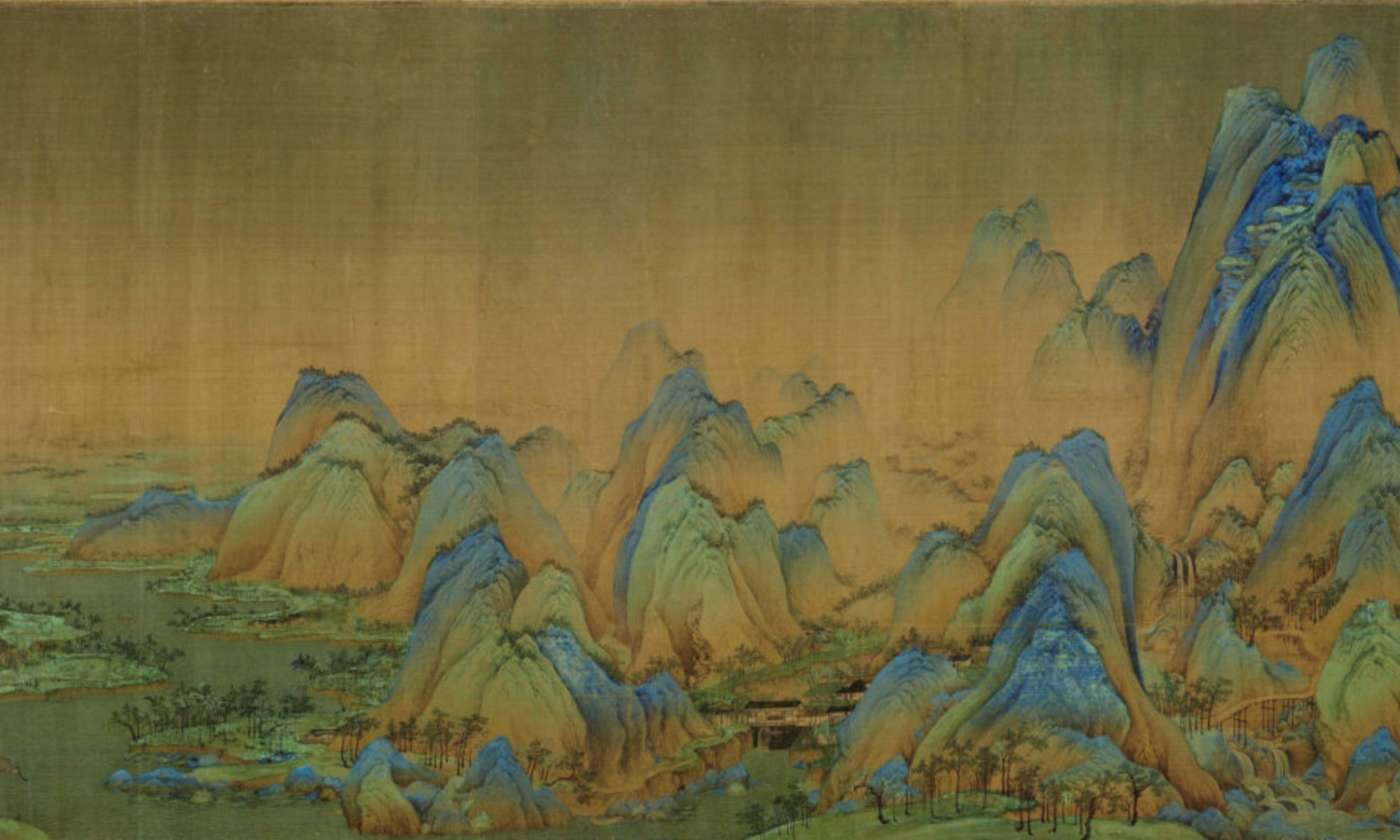Saturday, January 10, 2026: 3:30 PM-5:00 PM
Marshfield Room (Palmer House Hilton, Third Floor)
Session Organizer: Patrick Fuliang Shan, Grand Valley State University
Chair: Qiang Fang, University of Minnesota, Duluth
Papers:
Language, Commerce, and Empire: Introducing Chinese Instruction into US Higher Education, with Harvard as a Case Study
Shuhua Fan, The University of Scranton
“Securing and Holding Our Share of Influence and Trade in China”: Edwin Conger and US–China Relations at the Turn of the 20th Century
Tao Wang, Iowa State University
The Chinese Communist Party’s Transition from a Revolutionary Party to a Ruling Party, 1990s−2010
Xiaoqing Diana Lin, Indiana University Northwest
Who Are They? A Study of Chinese Legislators Elected During the First Nationwide Election in 1912–13
Patrick Fuliang Shan, Grand Valley State University
Comment: Guolin Yi, Providence College
Session Abstract: Political, Cultural, and Diplomatic Networks in China and Beyond”
This panel features four papers that explore the multifaceted relationships shaping the transformation of modern China and its interactions with the wider world. Since the mid-nineteenth century, China’s deep engagement with the international community has fostered exchanges of ideas, experiences, and models of development. Through these interactions, the Chinese sought new approaches to nation-building and state formation. The papers examine the evolving political, cultural, and diplomatic networks both among the Chinese themselves and between the Chinese and foreign actors. Together, the panelists offer fresh insights into how these transnational networks emerged through the adoption of new ideas, the forging of new relationships, and the pursuit of new goals. Collectively, these studies reveal how modern China’s history was shaped by a web of interconnected ideas, experiences, interpretations, and decisions born from its dynamic engagement with the world—an engagement that ultimately influenced the course of China’s national development.
Paper Abstracts
Language, Commerce, and Empire: Introducing Chinese Instruction into US Higher Education, with Harvard as a Case Study
Shuhua Fan, The University of Scranton
Serious efforts to introduce Chinese instruction into American colleges started in the 1870s with the inauguration of Chinese classes at Yale and Harvard and the establishment of an endowed professorship at the University of California-Berkeley. This paper uses the first Harvard Chinese language class (1879-1882) as a case study to examine the rise of pioneering Chinese programs in America in the late 19th century. Harvard started its Chinese class in 1879 because of the Chinese Educational Scheme presented in 1877 by Francis Knight, a U.S. consul and merchant. Authorized by Harvard, Knight made thorough preparations on both sides of the Pacific Ocean, including recruiting teacher Ko Kunhua, a Chinese poet, to carry out his scheme. The Chinese class came to a sudden end in 1882 due to Ko’s death, with no more help from Knight who died in 1880.
Using both primary and secondary sources, this paper explores the ways how domestic developments in the U.S. and China, U.S.-China interactions, and broader international context shaped Knight’s educational scheme. It argues that Knight’s scheme and the Harvard Chinese class reveal the interconnections among empire, commerce, Christianity, language, and higher education in late 19th century U.S.-China relations. These similar factors can help explain the rise of other Chinese programs in the U.S. and the rise of new or expansion of existing Chinese programs in Europe in the age of new imperialism. The paper also shows that the end of the entire program at Harvard with the teacher’s passing indicates that the cultural network constructed by Knight and participated by Ko was fragile, depending totally on one or two particular individuals’ availability or efforts. This paper fills a gap in the study of the pioneering Chinese language programs in American academia and contributes to the expanding literature on 19th century U.S.-China relations.
“Securing and Holding Our Share of Influence and Trade in China”: Edwin Conger and US–China Relations at the Turn of the 20th Century
Tao Wang, Iowa State University
As U.S. minister to China from 1898 to 1905, Edwin Conger underwent one of the most tumultuous periods in U.S.-China relations, including the European powers’ “Scramble for China” after the first Sino-Japanese War, the Hundred Days Reform, the anti-Christian riots culminating in the Boxer Rebellion, the U.S. espousal of the Open Door Policy, and the Chinese boycott of American products in 1905, which was the first nationalist movement in modern Chinese history. As the top U.S. diplomat in China, Conger played a crucial role in U.S. China policymaking during this period; yet the existing works have not examined his influence.
Using the diplomatic documents from the Department of State and the personal files such as those from Edwin Conger’s wife Sarah Conger, this paper explores the U.S. policy toward China during this period. It will answer the following questions: How did the U.S. respond to European imperialism in China? What was the U.S. perception of China’s modernization efforts and its internal power struggle? What factors contributed to the Open Door Policy, which served as the foundation of U.S. policy towards China for the first half of the 20th century? How did the U.S. meet the challenges of Chinese nationalism? And what role did Conger play in the U.S. China policymaking? This paper argues that the United States had successfully secured its interests to some extent while helping the Chinese, although it had limited presence and influence in China. Edwin Conger employed his personal connections in China to persuade his American colleagues to assume a practical attitude towards China. Consequently, his persuasive analysis of the Chinese situation and his poignant proposals had contributed significantly to America’s pragmatic foreign policy.
The Chinese Communist Party’s Transition from a Revolutionary Party to a Ruling Party, 1990s−2010
Xiaoqing Diana Lin, Indiana University Northwest
Calls for the Chinese Communist Party (CCP) to transition from a revolutionary party to a ruling party began in the aftermath of the June 4, 1989, government crackdown on student movements, and the collapse of the USSR. These events, along with major political campaigns in Communist China up to the Cultural Revolution, were perceived as the results of revolutionary and populist movements and were widely viewed as destructive and disruptive. These developments deeply influenced conservative-leaning Chinese reformers, prompting a reevaluation of radical and revolutionary approaches to modernization.
A key representation of this gradual shift in the CCP’s approach was the changing profile of its intellectual leadership or “brainpower.” The party moved from relying on Marxist theoreticians like Hu Qiaomu to intellectuals with broader academic training, such as Wang Huning. Before joining the CCP leadership in 1995 at the age of forty, Wang was a professor of international politics at Fudan University. He advocated for an institutional developmental approach over open democracy to advance China’s economy. His perspective drew on the successful stories of China’s Asian neighbors, including Japan, South Korea, and Singapore. Today, rebuilding China’s bureaucratic infrastructure remains a top priority for the CCP, with Wang’s ideas enjoying broad endorsement within the party. This paper explores how the CCP has redefined its role, focusing on demarcating the boundaries of the state’s administrative realm. It examines the party’s bureaucratic development efforts and the growing advocacy for statism among government leaders and left-leaning public intellectuals.
Who Are They? A Study of Chinese Legislators Elected During the First Nationwide Election in 1912–13
Patrick Fuliang Shan, Grand Valley State University
The Chinese, after the 1911 Revolution, held the first and only nation-wide popular election in late 1912 and early 1913, during which the eligible voters, who made up ten percent of the total population, elected over eight hundred senators and congressmen (representatives). Those newly elected legislators traveled to Beijing to convene the first national congress on April 8, 1913, which could be seen as the first democracy in Chinese history. This congress did not last long, however, because it was disbanded by Yuan Shikai on January 10, 1914. Thus, the short existence of this congress has not attracted much scholarly attention.
When we study this congress, important questions should be asked in regard to those eight hundred legislators. Who were those senators and congressmen? What were their family backgrounds? Why could they be elected? What did they do before and during the election? What role did they play in the short-lived congress? Because this congress existed for only nine months, what did they do in the future? Did they collaborate with diverse political parties, such as the CCP and the KMT (or GMD)? All these questions are important scholarly issues concerning the identities of those historical actors of China’s state-building efforts after the collapse of the Qing Dynasty. The paper argues that those legislators were Chinese elites from diverse regions and that they had played an important role in shaping China’s republican politics. Because of the future complicated political landscape, they would embark on diverse political roads. Nevertheless, their personal experience mapped modern China’s historical trajectory, in particular during the long 20th century.

